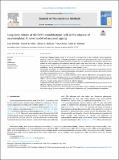Long-term culture of SH-SY5Y neuroblastoma cells in the absence of neurotrophins : a novel model of neuronal ageing
Abstract
Background Studying human ageing is of increasing importance due to the worldwide ageing population. However, it faces the challenge of lengthy experiments to produce an ageing phenotype. Often, to recreate the hallmarks of ageing requires complex empirical conditions that can confound data interpretation. Indeed, many studies use whole organisms with relatively short life spans, which may have little, or limited, relevance to human ageing. There has been extensive use of cell lines to study ageing in human somatic cells, but the modelling of human neuronal ageing is somewhat more complex in vitro. New Method We cultured the well-characterised SH-SY5Y human neural cell line to produce high purity cultures of cells differentiated to express a neuronal phenotype, and designed a protocol to maintain these cells in culture until they accumulated biomarkers of cellular ageing. Results Our data validate a novel and simple technique for the efficient differentiation and long-term maintenance of SH-SY5Y cells, expressing markers of neuronal differentiation and demonstrating electrical activity in culture. Over time in vitro, these cells progressively accumulate markers of ageing such as enhanced production of reactive oxygen species and accumulation of oxidative damage. Comparison to Existing Methods In comparison to existing techniques to model neuronal ageing our method is cost effective, requiring no specialist equipment or growth factors. Conclusions We demonstrate that SH-SY5Y cells, grown under these culture conditions, represent a simple model of neuronal ageing that is amenable to cell biological, biochemical and electrophysiological investigation.
Citation
Strother , L , Miles , G B , Holiday , A R , Cheng , Y & Doherty , G H 2021 , ' Long-term culture of SH-SY5Y neuroblastoma cells in the absence of neurotrophins : a novel model of neuronal ageing ' , Journal of Neuroscience Methods , vol. 362 , 109301 . https://doi.org/10.1016/j.jneumeth.2021.109301
Publication
Journal of Neuroscience Methods
Status
Peer reviewed
ISSN
0165-0270Type
Journal article
Description
LS is sponsored by a Wellcome Trust ISSF studentship and YC is a recipient of a China Scholarship Council award.Collections
Items in the St Andrews Research Repository are protected by copyright, with all rights reserved, unless otherwise indicated.

